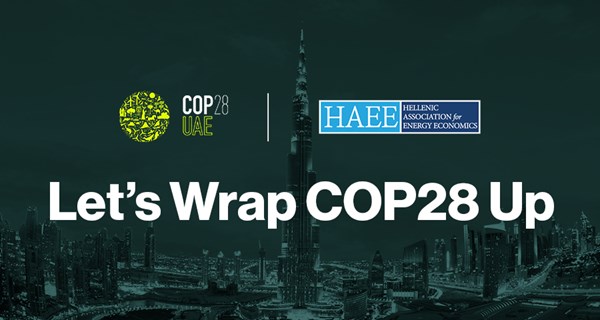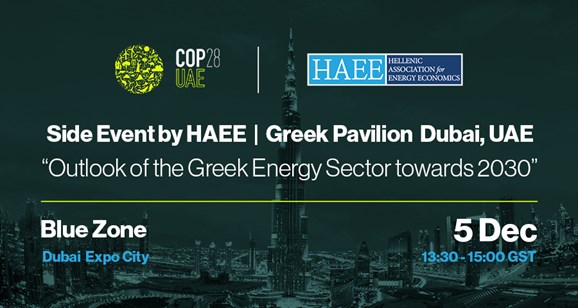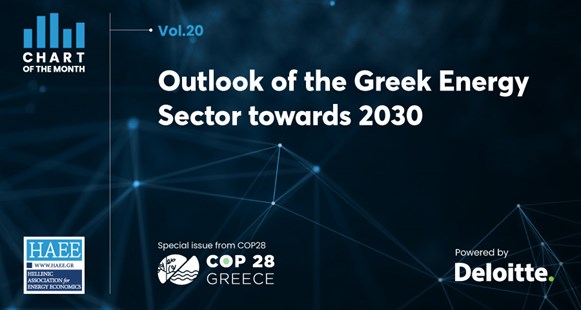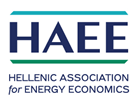HAEE proudly and actively participated in #COP28 by powering up the future at Greece’s first-ever Pavilion, organizing the Side Event "Outlook of the Greek Energy Sector towards 2030". We would like to thank our esteemed panel speakers, visionary leaders and guests who graced us with their presence or watched online and shared their insights on Greece’s accelerated transition away from fossil fuels, analyzed the latest reoriented policies, practices and investment priorities to deliver outcomes, protecting people, livelihoods, and ecosystems. Let us share a roundup of what we witnessed on the ground at COP28: On 13/12/2023, at the United Nations Climate Change Conference COP28 in Dubai, after intense overnight negotiations on whether the outcome would include a call to “phase down” or “phase out” fossil fuels, almost 200 nations reached an Agreement, to transition away from fossil fuels, while the negotiators set their commitments to triple renewables capacity and double energy efficiency by 2030, so as to achieve net zero by 2050. COP28 adopted a decision on the outcome of the first global stocktake, which is a two-year process to assess progress on mitigation, adaptation and climate finance, and design the way forward. The parties recognised that, by 2030, global greenhouse gas (GHG) emissions have to be reduced by 43% below 1990 levels to restrict global warming to 1.5 °C, and committed to accelerating action in the current decade. The Draft decision of COP28 - CMA.5 “Outcome of the first global stocktake” is now available here. An Agreement on the operationalisation of the Loss and Damage Fund was also decided. The fund will initially be hosted by the World Bank and It has received over US$700 million in pledges, with Germany and the United Arab Emirates offering US$100 million each . The involved parties further adopted a framework adaptation, accompanied with 2030 targets for all parties to: conduct impact, vulnerability and risk assessments; adopt and implement adaptation plans and policy instruments; and set up monitoring, evaluation and learning systems for their national adaptation efforts. After two weeks of intense discussions, the Deal that was reached in Dubai sends a strong statement to investors and decision-makers alike about the global community's intention to move away from fossil fuels, something scientists say is the best chance to prevent a global warming disaster. Let's keep pushing boundaries and working towards a sustainable and brighter future!
Key uptakes of HAEE’s Side Event, at COP28 Let's now deep dive into a micro-level and the insightful discussion we enjoyed on the 5th of December under the topic “Outlook of the Greek Energy Sector towards 2030” at HAEE’s Side Event that took place in the Greek Pavilion. The dynamic dialogue between esteemed speakers and visionary leaders was focused on the global, European, and Greek energy landscapes, the energy industry innovation, the impacts of Energy Transition and the ways of communicating the energy transition in a new climate narrative. As Ms. Ditte Juul Jørgensen, Director General for Energy, European Commission, mentioned, the international community has prioritized the exponential deployment of renewables and energy efficiency improvements by 2030 to meet the collective goal of the Paris Agreement to keep warming well below 2°C and phase down or even phase out fossil fuels by mid-century. To that end, and after the initiation of the EU, 123 countries have signed the Global Renewables and Energy Efficiency Pledge, underlying the close link between the climate and energy objectives. As we step into the future, Greece has already re-introduced its goals and position to achieve or event to overcome EU's climate obligations and emission target reductions, aiming to decarbonize its economy and transform itself into an energy hub in Southeastern Europe and the Western Balkans. In the wake of the Russo-Ukrainian war and as the EU is decoupling from Russia’s energy supply, Greece is playing a critical role in securing Europe’s energy resilience through the Southern Gas Corridor, the TAP pipeline and other infrastructure projects such as the expansion of the Revithousa Terminal, the completion of the IGB pipeline and the commissioning of Alexandroupolis FSRU. On top of that, as H.E. Geoffrey Pyatt, Assistant Secretary, Bureau of Energy Resources, U.S. Department of State, highlighted the overhaul of Alexandroupolis FSRU into a Western Balkans’, regional, emblematic Project. Greece’s connectivity moves in two strategic directions; one is to the Western Balkans, by helping the EU-aspiring countries to reduce their dependence on Russian energy and to the Mediterranean through the US, Greece, Cyprus, Israel and Egypt cooperation, to build a regional connection on gas, electricity through the interconnectors or even green hydrogen, aiming to build a future energy system which is not vulnerable to one supplier, which is economically competitive but also meet the climate targets. Ms. Alexandra Sdoukou, Deputy Minister of Environment and Energy, Hellenic Republic confirmed that over the last years, Greece has transitioned into an exporting country of gas—mainly from the US— new interconnections are in progress, and RES have the potential to dominate the future energy mix, increasing the attractiveness of the Greek energy sector to potential investors, shaping sustainable business strategies and fostering a resilient future for the country. Mr. Bertrand Piccard, Initiator and Chairman, Solarimpulse Foundation pointed out that the momentum to change the narrative of the economies’ and energy system’s decarbonization is now. There is a climate emergency, but also an economic emergency to switch to renewable energy and implement the necessary policy measures to save natural resources. The goal of authorities, academics, policy-makers and the relevant stakeholders has not to be the decarbonization with the sacrifice of the future generation, but to modernize the world, by making it efficient and profitable for the current generation. In that case, decarbonization will be the result of modernization. Mr. Roman Kramarchuk, Head of Future Energy Analytics, S&P Global - Commodity Insights, commented that S&P energy markets’ “Green Rule Scenario” involves cooperation, cross-country support, and sharing of technologies as prerequisites, to achieve three times renewable. Market mechanisms such as PPA or corporate voluntary carbon markets are driving the change since corporate buyers are now willing to be able to demonstrate that they can operate sustainably and become policy-makers of their own right, supported by governments. This is a paradigm of multiple actors initiating for a common goal, the goal of achieving net-zero. The political will exists, the technology exists, and the market mechanisms are ready to be implemented. Our focus should be on informing, motivating, engaging people and communities toward the energy transition. HAEE is looking forward to next year's event, COP29 which will take place in Baku, Azerbaijan, in November 2024 with the hope of a much more optimistic climate outlook! 👉 Browse our photo gallery from Dubai in our website.
Presenting our Chart of the Month Vol. 20, in the Side Event organized by the HAEE team and the Hellenic Ministry of Environment and Energy at the Greek Pavillion in COP28, is the epitome of ending the year on a high note! This special edition gives a more detailed outlook of the Greek energy market towards 2030 and 2050 through various topics encircling energy. Based on the revised Greek NECP, key milestones and targets for the energy transition of the Greek energy market are presented across specific subtopics such as the future RES and energy storage developments, the Natural Gas landscape in Greece, the future outlook of the interconnections, as well as opportunities in innovative technologies like CCUS and Hydrogen production. Special focus is placed on important topics that form the pillars of Greece’s strategy for the energy transition. One such topic is the development of offshore wind parks in the Aegean and Ionian Seas. The first such pilot project was recently announced in Alexandroupolis with capacity of 600 MW. Additionally, in Alexandroupolis, another interesting project, the FSRU terminal, is expected to become operational in 2024. Finally, we explore the investment landscape of Greece which is thriving with a recently upgraded investment grade and forecasts of surpassing EU growth rates. Significant funding inflows via RRF and REPowerEU promise a bright future for the sector. Favorable conditions for both traditional and emerging renewable energy technologies, alongside pivotal infrastructure developments, position Greece as a key player in Europe's energy independence, with the overall ambition of transforming Greece into an energy hub for Europe. 👉 You may download the special issue here.
|





